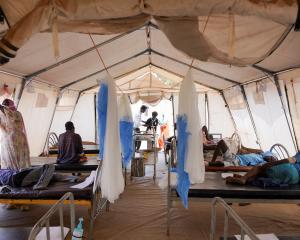The European Union's decision-making processes lend new depth to the word ''incoherent'' and the current British Government's default mode is nastiness, but they have both outdone themselves this time.
The subject at hand is the Italian Navy's ''Mare Nostrum'' operation, which has rescued 150,000 refugees and migrants from leaky, overloaded boats in the Mediterranean since it was launched a year ago.
An estimated 3000 others have drowned since January; you can't save them all. But the Italian Navy has done an excellent job, with no help at all from other EU countries - which is very unfair, since Italy is simply the nearest part of the European Union to the North African coast from which the boats start out.
Finally, after endless pleas from Italy, the other EU members gathered in Brussels earlier this month and agreed to replace the Italian ships with a joint EU mission code-named Triton. But there was a catch. In fact, there were several.
Triton will have only one-third of the financial resources that Mare Nostrum had. It will have precisely six small ships, two fixed-wing aircraft and one helicopter, instead of the Italian Navy's ample supply of ships and aircraft. It will have no search-and-rescue function at all, and it will only operate up to 30 nautical miles (50km) from Italy's coasts. Further out, they'll just have to drown.
It's quite an efficient way of ensuring that fewer refugees actually reach the EU, but it is so stunningly callous that even the British Foreign Office's official spokesman felt obliged to spin it as a humanitarian initiative in heavy disguise.
''Ministers across Europe have expressed concerns,'' he said, ''that search and rescue operations in the Mediterranean have acted as a pull factor for illegal migration, encouraging people to make dangerous crossings in the expectation of rescue. This has led to more deaths as traffickers have exploited the situation using boats that are unfit to make the crossing.''
So letting lots of them drown will presumably discourage others and save more lives in the end. Enter Admiral Filippo Maria Foffi, commander-in-chief of the Italian Navy, who promptly torpedoed the whole ''drown them to save them'' argument.
The refugees, fleeing from Syria, Eritrea or even further afield, travel for up to three months before they reach the shores of North Africa, he said. They suffer hardships that kill up to half of them, and then they board the boats.
''If someone is speaking about a `pulling factor', he doesn't know what he is speaking about,'' he said.
Adm Foffi had more to say. He had received no orders from the Italian Government to shut down Mare Nostrum, he said, and so long as he did not, he would continue the search-and-rescue operations.
There is clearly a struggle within the Italian Government about whether to just let the refugees die, or continue funding Mare Nostrum alone in the absence of an acceptable substitute paid for by the EU. But Prime Minister Matteo Renzi and Defence Minister Roberta Pinotti both seem to be on the side of the angels, so there is still hope that the operation may continue.
The EU, of course, is acting with its usual combination of cowardice and confusion. The British Government is playing dog-whistle politics again: it expects the target audience, those who are being seduced away from their Conservative roots by the anti-immigrant Ukip Party, to understand that it really wants to drown the refugees, not save them.
And lots of other European governments really want to drown the refugees too: the amount of money at stake is not large enough to serve as an alternative explanation for this decision.
It may yet be thwarted, at least for the moment, by admirable Italians like Filippo Maria Foffi, but the EU is really talking about killing people here. Or letting them die, if you prefer, but it comes down to much the same thing.
How long before they start actively killing refugees fleeing from war, hunger and climate change along Europe's Mediterranean sea frontier (and along Australia's northern sea frontier, and the US border with Mexico, and probably South Africa's northern border too)?
Ten to 15 years, at a guess. We'll all have got used to the principle by then.
Gwynne Dyer is an independent London journalist.











